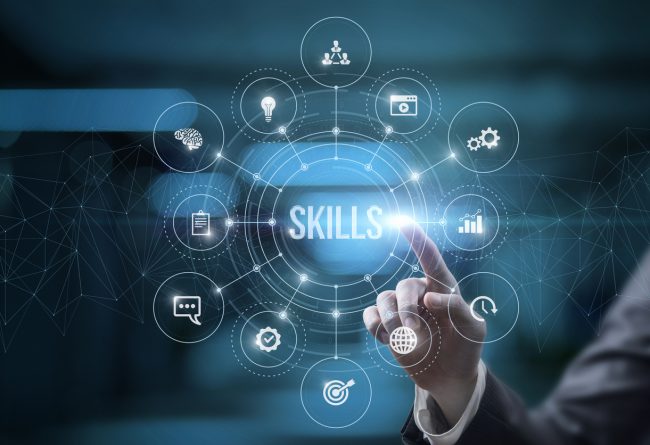Top Skills for 2025: Preparing Your Government Workforce

Top Skills for 2025: Preparing Your Government Workforce
From AI-powered permit processing to virtual citizen services, 2024 brought many challenges to the public sector. These trials created a fundamental shift in how government agencies operate and serve their communities. While these changes have improved service delivery, they’ve also created new challenges in workforce development, technology adoption, and talent retention.
To successfully navigate 2025, it’s essential to first understand the challenges government agencies confronted in 2024. Looking back at 2024, three significant hurdles have emerged that are reshaping public service delivery and workforce development. By looking at these challenges, we can prepare our teams for what’s ahead.
To successfully navigate 2025, it’s essential to reflect on the obstacles government agencies faced in 2024. Three significant issues have emerged that are transforming public service delivery and workforce development. By addressing these shifts, we can better prepare our teams for what lies ahead.”
Looking Back: Key Challenges That Shaped Government Workforce in 2024
The Technology Transformation Challenge
Walk into any government office today and you’ll see the technology revolution in action – from virtual citizen services to AI-assisted document processing. Government agencies are at a crossroads between old systems and new solutions. The emergence of generative AI (GenAI) has added another layer of complexity – while it can do amazing things for service delivery and operational efficiency, it also requires careful consideration of security, privacy and ethics. Some state governments have already started pilot programs to test AI in resident services and administrative tasks, but many agencies are still figuring out how to do this responsibly.
Evolving Service Delivery Expectations
Citizens expect the same level of digital accessibility and responsiveness from government services as they do from private sector organizations. This has forced agencies to rethink how they interact with the public, from modernizing online platforms to training staff on new digital tools. The shift to hybrid work has added another layer to this challenge; agencies need to maintain high service standards while managing distributed teams.
Modernizing Government Recruitment
How long did it take the last time you posted a government job? If you’re wincing right now, you’re not alone. The good news is agencies are finally breaking free from those old recruitment practices that have held us back. Some forward-thinking departments are already showing us how it’s done – they’ve halved their hiring times by streamlining processes and using digital tools. Working with local universities isn’t just about filling today’s vacancies; it’s about creating a pipeline of talent who get and are excited about public service. When we modernize how we recruit, we’re not just filling positions faster – we’re showing potential candidates that government work can be cool and innovative.
Workforce Development and Retention
Ask any agency leader what keeps them up at night, and you’ll likely hear about talent retention. The competition for skilled workers has never been more intense, especially in technical roles. Many agencies have struggled to offer competitive development opportunities and clear career progression paths, resulting in higher turnover rates than desired. This has shown us the need for a new approach to workforce development and skill-building in government.
2025: Advancing Government Work Through Modern Skills and Methods
As we head into 2025, the skills required to succeed in government are changing fast. Let’s examine the key competencies that will help public sector employees thrive in this new world.
Digital Literacy and AI Readiness
GenAI is coming, and it presents both opportunities and challenges for government agencies. There is a common myth that AI requires technical expertise, but the reality is more subtle. Today’s AI tools are getting more user-friendly and accessible to nontechnical staff. The key issue is having a basic understanding of how these tools can enhance – not replace – human work.
In practice, this means government employees should understand how AI can streamline their daily work, from document processing to citizen services. You’ll need to develop judgment about where AI makes sense in your agency’s processes, always keeping security and ethical considerations at the forefront. Just as importantly, you should be comfortable working with data to make informed decisions.
Public Service Innovation
Gone are the days when innovation in government was centered around new ideas. Today, it’s about real results citizens can count on. Your task? Finding ways to simplify services while keeping the public’s trust. Think of the agency that turned its permit process from 6 weeks to 3 days. They didn’t just digitize forms – they reimagined the whole experience from the citizen’s perspective. Or how state health departments are now sharing data across jurisdictions to track public health trends – something that was impossible a few years ago.
Therefore, success in this space means mastering several connected skills. You’ll need to know process improvement methods that work in government. You’ll have to guide your teams through change while navigating complex regulations. More importantly, you’ll need to design services that put citizens first and build partnerships across agencies to make those services work seamlessly.
Leadership in the Modern Government Workplace
Government work is evolving and requires a new approach to leadership. Today’s public sector leaders should balance conventional management skills with new skills to address emerging challenges.
Tomorrow’s government leaders will need to master several critical areas. They must know how to keep hybrid teams engaged and productive while making smart decisions about limited resources. When crises arise – and they will – these leaders need to respond quickly and adapt their approach. Perhaps most importantly, they should focus on developing their team members’ skills through active mentorship.
A Diverse and Inclusive Public Sector
Here’s a fact we can’t ignore: our communities are diverse, but too often, our agencies aren’t. Modern government leadership goes beyond managing teams – it’s about building them deliberately and inclusively. We’re seeing this happen across the nation. Agencies have transformed their recruitment practices and created employee resource groups where everyone has a voice. The most successful government leaders in 2024 aren’t just talking about diversity; they’re actively mentoring the next generation of public servants from all backgrounds. When your team looks like the community it serves, you’re not just doing the right thing – you’re delivering better services.
What will set successful government leaders apart come 2025 is their ability to guide their teams through technological change while focusing on core public service values. This means developing and honing skills in people management and digital transformation. Leaders need to know enough about new technologies to make informed decisions about implementation and ensure their teams have the support and training to adapt.
Resilience and Continuous Learning
Perhaps the most important skill set for 2025 is the ability to adapt and grow. Government service isn’t slowing down, and success is increasingly dependent on us being able to evolve with it.
Success in 2025 will demand several essential capabilities. Cybersecurity awareness isn’t just for IT anymore – it’s becoming a fundamental skill for all government employees. You’ll need to work seamlessly across agency boundaries and manage complex projects within regulatory frameworks. The advantage of this is that the ability to use data to guide decisions will be crucial.
Upskill and Retain Talent Through Innovation
We can all agree that keeping our best people isn’t just about pay anymore. The agencies winning the retention game know something important: today’s public servants want to see a clear path forward and the flexibility to balance their lives. We’re seeing innovative departments offering hybrid work options that would have been impossible a few years ago. They’re creating mentorship programs that work and recognition systems that celebrate real achievements, not just years of service. The result? Teams that stick around because they can see their future in public service. When we invest in our people’s growth and adapt to their changing needs, we’re retaining talent and building the foundation for a better government.
Professional development doesn’t always mean formal training. Many government agencies are finding success with mentorship programs, cross-departmental projects and hands-on learning. The aim here is to create an environment where continuous learning is part of the daily workflow, not an add-on.
Conclusion
As the needs of government learning and training continue to evolve, we must evolve with them to ensure employees are equipped for the challenges ahead. For the past 25 years, Enterprise Training Solutions (ETS) has offered online training to the public sector that drives employee effectiveness and productivity. To learn more about courses available through ETS, go to:
https://enterprisetraining.com/catalog/leadership-and-professional-development-solution/


